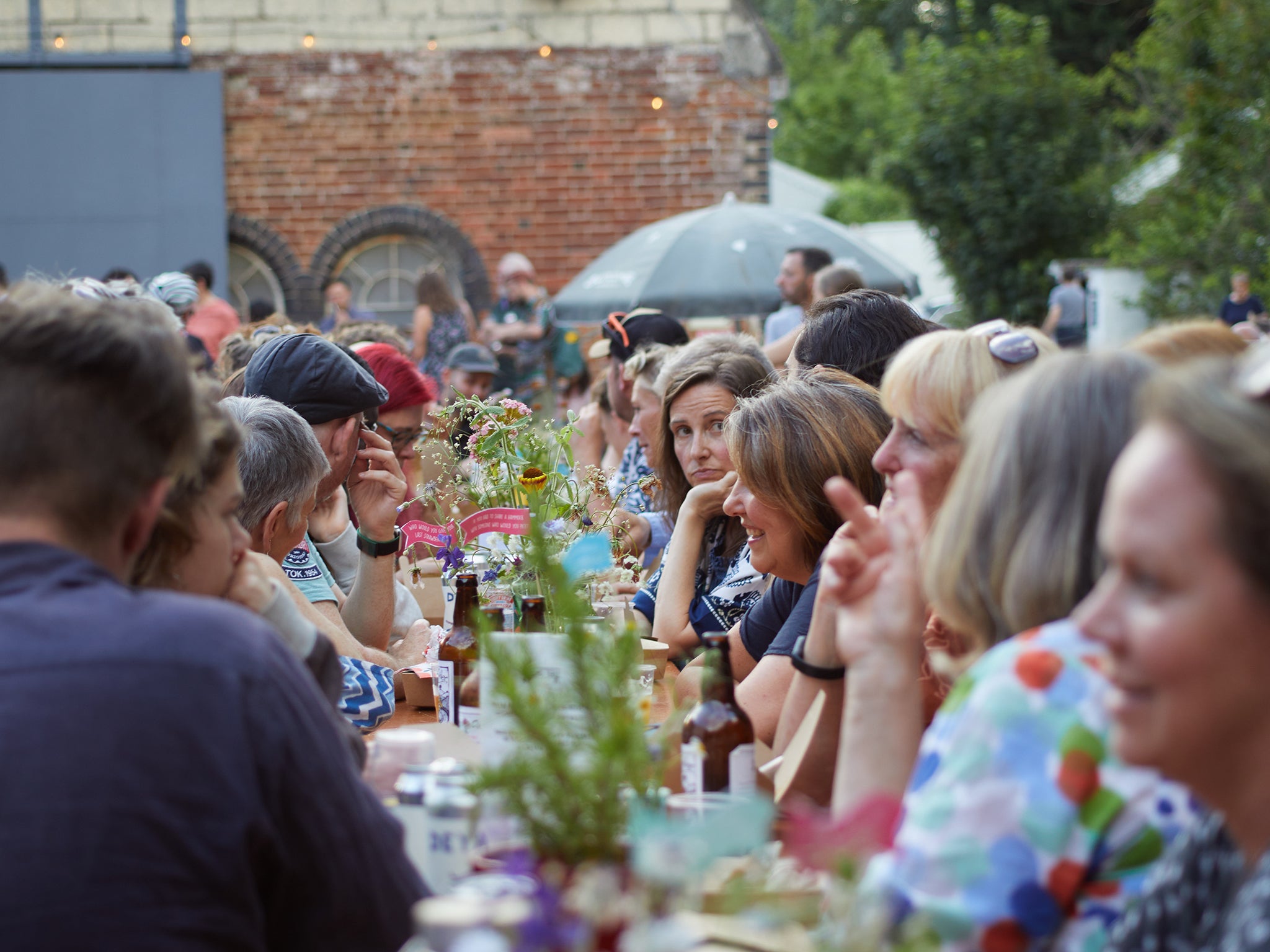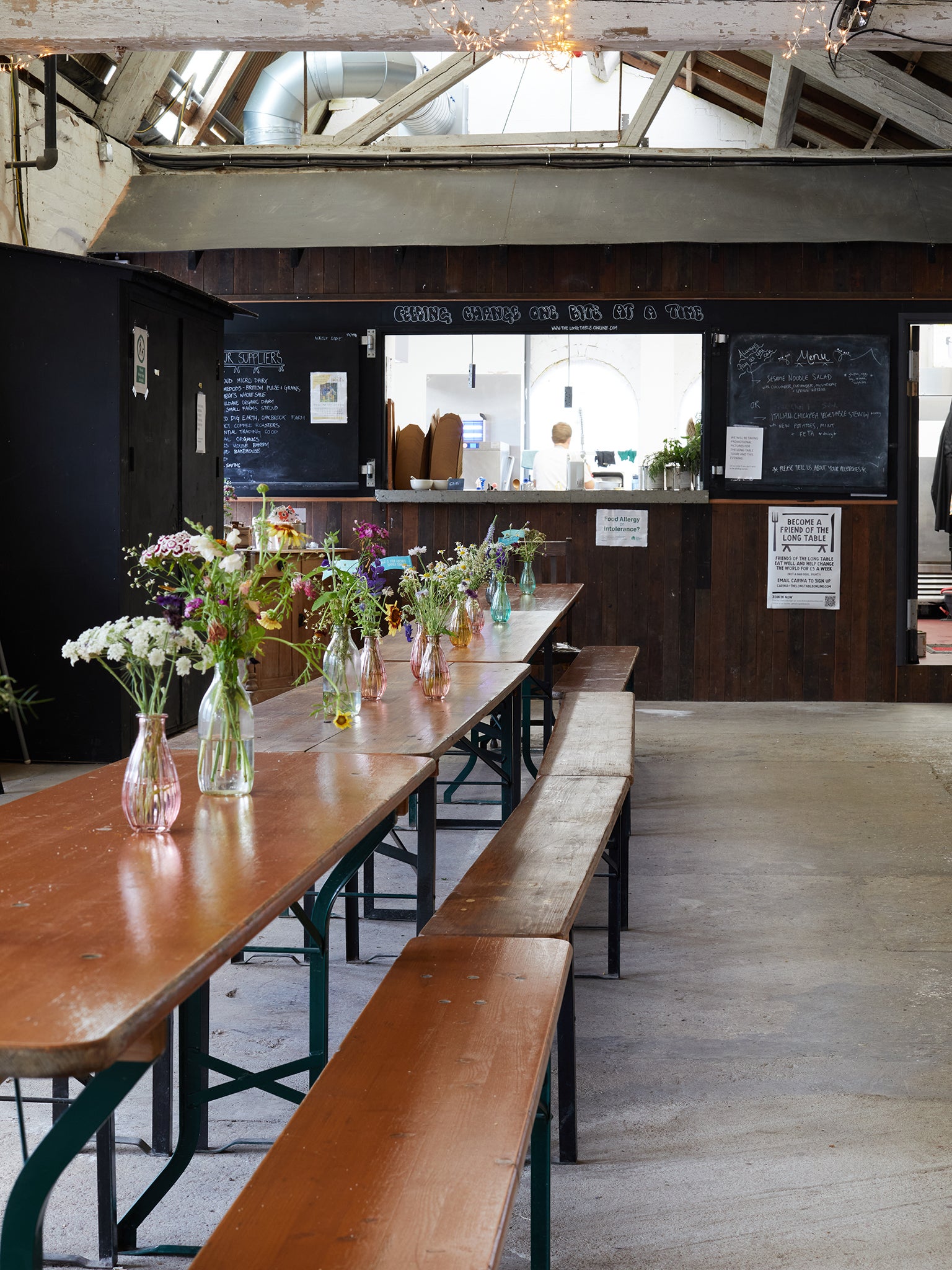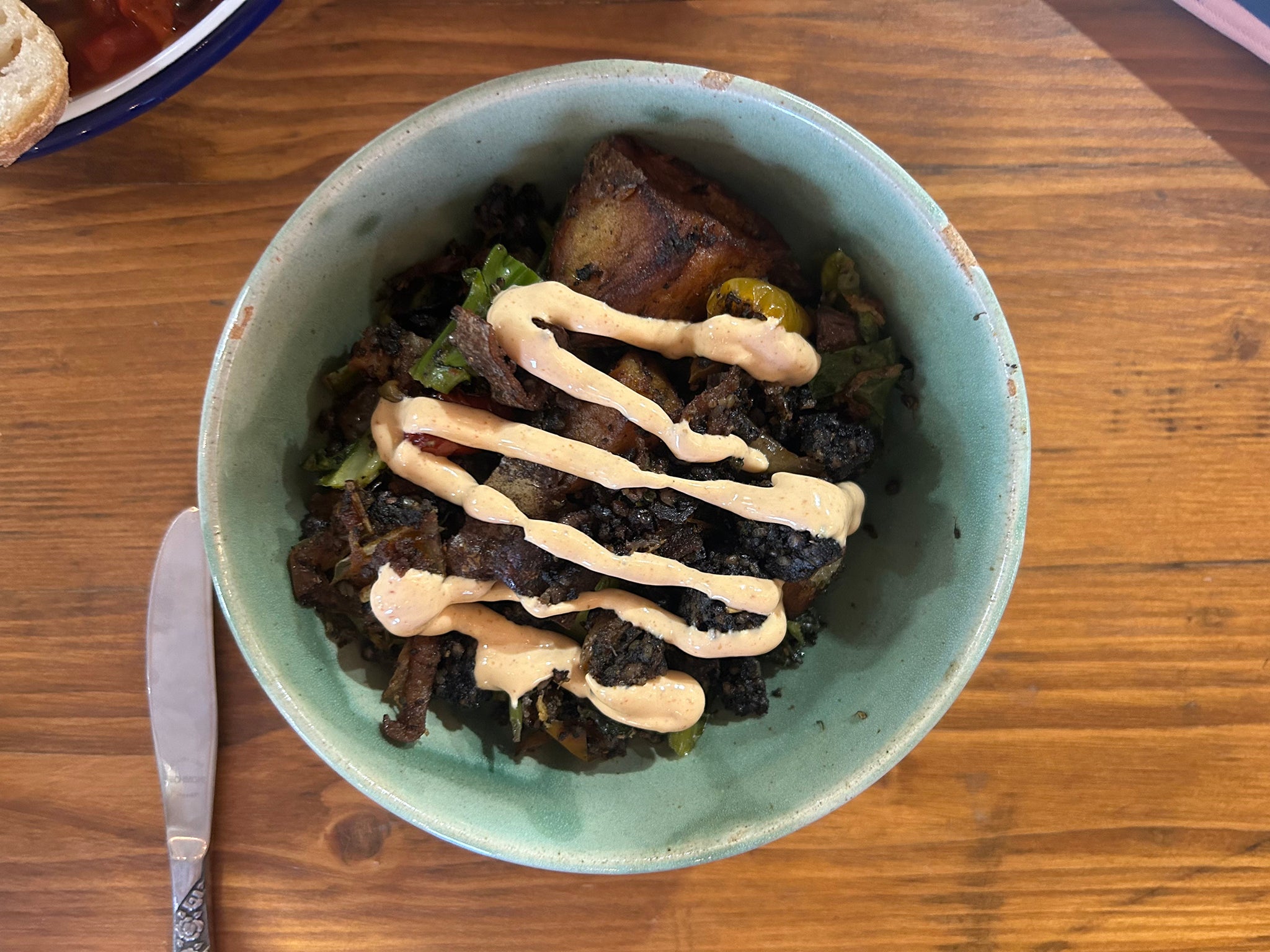Could the trend for ‘pay-what-you-can’ restaurants save the hospitality industry?
The restaurant industry is facing some of its toughest challenges, but could paying what you think a meal is worth, as well as what you can reasonably afford, be its salvation? The owners of The Long Table think so and tell Emma Henderson why their radical approach offers a refreshing vision for us all


One lunchtime in January 2023, Laura Cammish was joined at The Long Table by Clare Pitman, where they chatted and ate together. Once strangers, they were brought together by a new restaurant concept and now meet every week not only to have lunch, but also to play table tennis. But it’s not just friendship they struck up.
After Cammish shared her story of being without permanent accommodation and suffering a serious back muscle injury, which meant she had very limited mobility and couldn’t work, Pitman said: “I think I can help with that, I’m a cranial osteopath,” and offered her treatments at a pay what you can rate, replicating The Long Table’s business model.
The Long Table restaurant, set inside Branscombe Mill, just outside Stroud, is the brainchild of co-founders Tom Herbert, a fifth-generation baker, and Will Mansell, and began in 2018.
It’s a community interest company (CIC), meaning its profits go back into supporting the community. At its heart, it’s about feeding people and eating together.
The name points to the restaurant’s impressively large tables, designed to encourage socialisation. Long rows of tables can seat up to 150 at any one time. However, if more people come, Will North, director of The Long Table, says they don’t turn anyone away, and instead happily bring in more tables and find space.
The idea of the restaurant is simple. Customers pay what they can for the meal, sit down to eat and get chatting with others around them, encouraging great things to happen – just like the meeting of Cammish and Pitman. Of course, there’s no judgement on who pays for what.
On average around 10-12 per cent of people access a meal paid forward, 50 per cent of diners pay what they can, 20 per cent pay under the cost of the meal and 30 per cent pay over the cost, which is currently around £8.51 per meal.
The concept is something other restaurants and cafes have been trying with their own versions of “pay it forward” and “pay what you can” models, such as Social Bite Food, with cafes in Scotland and central London, and Cafe Van Gogh in south London.
Ruth Rogers is the founder of social enterprise The Canvas cafe in Shoreditch, which was sadly forced to close in 2022 due to the pandemic, though she now has plans to reignite the ethos in existing cafes countrywide.
The Long Table’s business model is made possible by the Friends of The Long Table, a group who each pay £5 a week to support it, and almost all of whom are from the local area. This large network of continual contributions means there’s always a meal available and ensures the restaurant isn’t reliant on one-off donations.

Money is also made on goods from the cafe and the bar too. Another big factor is there are no shareholders. “If you don’t have to pay shareholders, you can put that money into supporting people who need it,” adds North.
This, however, doesn’t mean things are plain sailing financially. “We will just turn a very small profit after being £35k in debt halfway through the year,” he explains.
Well-trained front-of-house servers explain to new customers how the concept and payment work, then give them a meal token. Staff can offer a meal paid forward to anyone, and anyone can ask for “a meal for Tom”, which is code for one that’s been paid forward.
Some people who don’t have the means and have been referred have already been provided with tokens for a meal before they even enter the restaurant.
Deciding what to pay can be difficult, but after eating, most of the people say they wish they’d paid more. To make it simpler for customers, The Long Table would like to implement a self-service approach to its meal tokens, but North says they come up against tech issues which are preventing them from rolling it out.
I often say I owe my life to this place because you could imagine how it could have gone another way if I hadn’t met the right people at the right time
The ethos is about giving people dignity too, and The Long Table doesn’t see its approach as offering charity. “We don’t use the words ‘free’ or ‘poverty’,” says North.
Inside the mill is also a furniture store, a bike hire and repair shop and a children’s toy and clothes shop, which all work on a similar paying premise too. “One of the hardest things for anyone to do is to say they are struggling and it might take someone weeks or months to build up to that, but once someone walks into the space here, we’re ready to support that person,” adds North.
North and I are sitting at one of the tables having lunch, while he explains the plans for their next site in the centre of Cirencester, due to open late summer.
There are also plans for more restaurants to open, but finding out their current rented site, Branscombe Mill, is to be sold has brought them back down to earth with a vicious bump.
They’re remaining positive, though, as after sharing the news, they received an “outpouring of love and support” from as far away as America, North says. The news of the sale has been tough on them all, but ultimately made the team stronger.

That’s in part down to their view of how the industry should work, and their approach to making it better, which they describe as radical hospitality. “We’re here to show there’s a totally different vision for the hospitality sector that can focus on people and the planet. Restaurants shouldn’t be a luxury,” North says.
One of the biggest problems across the industry is access, not only to good nutritious food and company, but also to arts and culture, which they offer as well in the form of free live music and film nights.
Staff wages are included in this attitude. All 24 members are paid above the real living wage (currently £13.15/hour within London and £11.95 outside). North says it’s especially important to them considering some “large hospitality businesses are saying ‘we can no longer afford to be a living wage employer’”. It’s also about “how we treat customers, how we expect customers to treat us and how we treat each other,” he adds.
The restaurant starts getting busy ahead of lunch and on the menu today are two choices: black pudding hash with buttered greens and chipotle mayo, or peperonata with lemon and oregano potatoes, hazelnut pesto, whipped feta sauce and a slice of focaccia.
One of the hardest things for anyone to do is to say they are struggling and it might take someone weeks or months to build up to that, but once someone walks into the space here, we’re ready to support that person
Sounds pretty good, right? I go for the latter: a hearty and delicious slightly-spiced dish, full of veg served as a very generous portion – apparently, head chef Chris Burger is known for them.
About 50 per cent of the ingredients Chef Burger (great name) is using today are from food waste charity FareShare, but there’s no one day the same and there’s not a reliance on donated food, or food waste.
Instead, The Long Table works with plenty of hyperlocal and smaller producers directly, securing a better price, including buying fruit and veg from Wick Court Farm (part of Farms for City Children, owned by children’s author Michael Morpurgo) and mutton from Stroud Slad Farm, to name a few.
North is proud of their symbiotic relationship with producers, working “from the bottom up”. “We are producer-led,” he says. “We don’t go to producers saying we would like ‘X’, we go to them asking ‘what have you got?’, so they can sell us what they need to.”
It reduces waste and works with the seasons. Going further, The Long Table supports its producers too. “We’re co-investing with Good Small Farms where we have guaranteed purchase of two acres,” he explains. This helps them forecast what they produce, knowing there’s already investment.
“When it comes to meat, we buy whole animals,” North says. They use beef, pork and mutton at the moment as they can guarantee their provenance. “Today that’s beef black pudding and not pork. The animals we buy aren’t raised for their meat, they’re byproducts. The cows are National Trust wildflower meadow conservation animals and our last cow was 12 years old,” adds North.
They also use other high-quality products, including Wildfarmed flour from regenerative farms across the UK and pulses from Hodmedods, a British bean, pulses and grain grower in Suffolk. Their circular system ensures little is wasted thanks to the big composter outside. Herbs and chillies are grown in the homemade compost and any surplus is given away.
So, is this the future of hospitality? It certainly could be, proving eating good nutritious food with others shouldn’t be a luxury and championing the ethos that food is also about helping people and doing so with dignity. It’s a sentiment shared by customer Laura Cammish too: “I often say I owe my life to this place because you could imagine how it could have gone another way if I hadn’t met the right people at the right time.”



Join our commenting forum
Join thought-provoking conversations, follow other Independent readers and see their replies
Comments